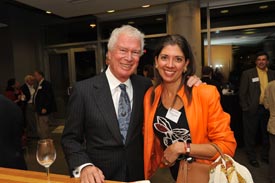Henri Habib Distinguished Lecture with Kenneth D. Taylor
During the Iranian Revolution in 1979, a group of students forcibly took over the American embassy in Tehran. The new Islamic Republic then held 52 embassy staff and other Americans hostage for 444 days. Fortunately, six Americans managed to escape before being grabbed and soon found refuge in the Canadian embassy.
Canadian Ambassador Kenneth D. Taylor helped hide the group for three months and, eventually, spirit them out of the country to safety. When the news broke, Taylor became a Canadian—and American—hero. (The exploits are recounted in Our Man in Tehran: Ken Taylor, the CIA and the Iran Hostage Crisis, by Robert Wright, 2010.)

Taylor related his views on the revolution, along with a myriad of other topics surrounding past and present Iran and the Middle East, to 250 Concordia alumni, students, faculty members and others at the D.B. Clarke Theatre on September 21. His talk, called “Iran – The Middle East Power,” was part of the Henri Habib Distinguished Lecture Series and was part of the university’s Homecoming ’11 festivities.
Faculty of Arts and Science Dean Brian Lewis introduced the former ambassador to the audience, which included Habib, a Concordia Distinguished Professor Emeritus. Taylor recalled talking to one of Habib’s Political Science classes back in 1983. He added that the same year Habib arrived at Concordia—1960—Taylor had just begun his foreign-service career and “was boarding a freighter in Oakland [Calif.] to Guatemala. I became a vagabond diplomat.”
 Csaba Nikoleny, Concordia Political Science Professor and Chair; David Graham, Provost and VP, Academic Affairs; Susan Raymer, L BA 71; Frederick Lowy, President and Vice-Chancellor; Claire Kruyt; Kenneth D. Taylor; Henri Habib, Concordia Distinguished Professor Emeritus; Dominique McCaughey, Acting VP, Advancement and Alumni Relations; Brian Lewis, Dean, Faculty of Arts and Science; Peter Kruyt, BComm 78, Chair, Board of Governors
Csaba Nikoleny, Concordia Political Science Professor and Chair; David Graham, Provost and VP, Academic Affairs; Susan Raymer, L BA 71; Frederick Lowy, President and Vice-Chancellor; Claire Kruyt; Kenneth D. Taylor; Henri Habib, Concordia Distinguished Professor Emeritus; Dominique McCaughey, Acting VP, Advancement and Alumni Relations; Brian Lewis, Dean, Faculty of Arts and Science; Peter Kruyt, BComm 78, Chair, Board of Governors

Nearly two decades later, Taylor found himself in Tehran during the historic revolution. “It stunned everyone,” he admitted. “The revolution introduced a hybrid: a republic and Islamic government.” Taylor described the rebellion as one of the three major Mideast events of the 20th century, along with the fall of the Ottoman Empire and the creation of the State of Israel.
He did not pass judgement on the current regime as he discussed its controversial political leadership and nuclear pursuit. “Iranians feel passionate about their country,” he said, adding that “it was, you could say, the world’s first superpower,” since the Persian Empire emerged in the 6th century BC. Taylor contended that Iran will remain a central player in the region because of its huge oil reserves and that it lies at the “crossroads of the world.”

Taylor touched upon other current Mideast issues including Turkey’s growing ambitions to emerge as a regional force, Sunni Saudi Arabia’s concerns about Shiite Iran, and the yet-to-be-determined conclusion of the Arab Spring. The lecture occurred two days before the Palestinian Authority was to make its bid for statehood to the United Nations Security Council. Representatives of the Mideast Quartet—the U.N., United States, European Union and Russia—were frantically working behind the scenes to reach a diplomatic compromise beforehand, he reported. Although they only had about 24 hours left, “A day is a lifetime in diplomacy,” Taylor said.
Taylor clearly enjoyed seeing the world through his foreign service; he advised the university students to “graduate, get a passport and leave town.”

The lecture ended with an audience question-and-answer session moderated by Concordia Political Science Professor and Chair Csaba Nikolenyi. Shortly after, about 40 guests gathered for a cocktail reception in the Engineering, Computer Science and Visual Arts Integrated Complex. They were treated to an exchange and further discussion about the Middle East between Habib and Taylor. The venerable Political Science professor said Taylor is something we don’t see much of today, “a fine Canadian diplomat.”